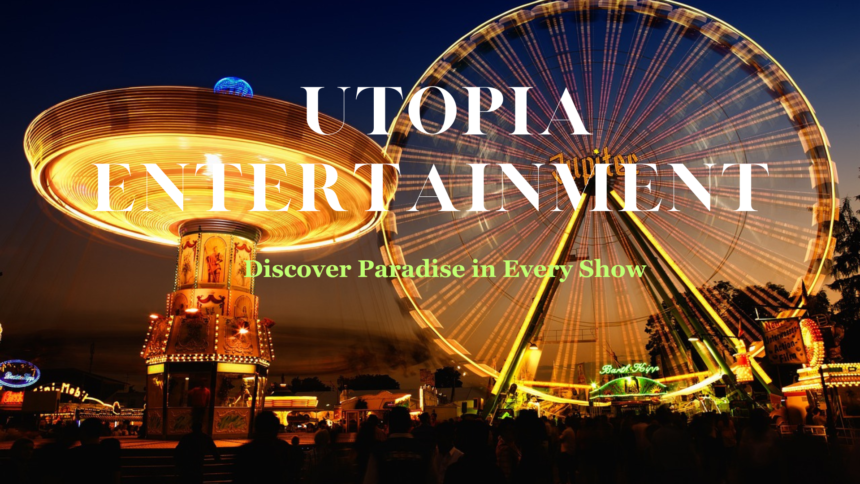In a world brimming with turmoil and uncertainty, the pursuit of a perfect escape has always been a human inclination. This desire manifests in various forms of entertainment, evolving through the ages from ancient theater and literature to the digital realms of today. The concept of “utopia entertainment” encapsulates this ideal perfectly—providing an experience so immersive and fulfilling that it offers a temporary haven from the chaos of reality.
The Genesis of Utopia Entertainment
The roots of utopia entertainment can be traced back to early human civilizations, where storytelling and myths served as a refuge from the hardships of daily life. Ancient Greeks, for example, created elaborate theatrical productions that transported audiences to different realms, often depicting idealized worlds of gods and heroes. This tradition of seeking solace in idealistic narratives continued through the centuries, influencing literature, art, and eventually, modern media.
With the advent of the 20th century, the concept began to take on new dimensions. Cinema emerged as a powerful medium, capable of crafting entire worlds that audiences could immerse themselves in. Films like “The Wizard of Oz” and “Star Wars” offered not just stories, but entire universes that promised an escape into the extraordinary. This era marked the beginning of a more sophisticated approach to entertainment, where the boundaries between reality and fantasy became increasingly blurred.
The Digital Revolution and Beyond
The dawn of the digital age has revolutionized the landscape of utopia entertainment. Video games, virtual reality (VR), and augmented reality (AR) technologies have pushed the boundaries of what is possible, creating interactive experiences that are more immersive than ever before. Games like “The Legend of Zelda” and “The Elder Scrolls” series offer expansive, meticulously crafted worlds where players can lose themselves for hours on end, embarking on epic quests and exploring every nook and cranny of these digital utopias.
Virtual reality, in particular, represents a significant leap forward in this pursuit. VR technology enables users to step into entirely new environments, interacting with them in ways that were previously unimaginable. Whether it’s exploring a fantastical landscape, participating in a space mission, or simply enjoying a serene beach, VR has the potential to create experiences that feel profoundly real, providing an unparalleled escape from the mundane.
The Psychological Appeal
At the core of utopia entertainment lies its psychological appeal. Human beings have an innate need for escapism—a desire to break free from the constraints of reality and immerse themselves in a world where their dreams and fantasies can come to life. This is not merely a form of distraction, but a vital coping mechanism that allows individuals to manage stress, anxiety, and the pressures of everyday life.
Research has shown that engaging with utopian narratives can have significant mental health benefits. Immersive entertainment experiences can provide a sense of agency and control, boost creativity, and even improve mood and emotional well-being. In a world where mental health challenges are increasingly prevalent, the role of these perfect escapes as a source of psychological solace cannot be overstated.
Ethical Considerations and Future Prospects
While the allure of utopia entertainment is undeniable, it also raises important ethical considerations. The line between escapism and addiction is a fine one, and there is a risk that individuals may become overly reliant on these experiences, neglecting their responsibilities and real-world interactions. It is crucial for creators and consumers alike to strike a balance, ensuring that the pursuit of utopian escapism does not come at the expense of reality.
Looking to the future, the potential for utopia entertainment is boundless. Advances in artificial intelligence (AI) and machine learning promise to create even more personalized and immersive experiences. AI-driven characters and narratives can adapt to individual preferences, crafting bespoke utopian worlds that cater to the unique desires and needs of each user. Furthermore, the integration of biometric feedback—such as monitoring heart rate and brain activity—could enable even deeper levels of immersion, creating experiences that respond in real-time to the user’s emotional and physiological state.
Cultural Impact and Societal Reflections
Utopia entertainment is not just a personal escape; it also reflects broader societal trends and cultural aspirations. The themes and narratives that resonate most deeply with audiences often mirror the collective hopes, fears, and values of the time. For example, dystopian narratives, which have become increasingly popular in recent years, may be seen as a reflection of societal anxieties about the future. In contrast, utopian themes offer a vision of what could be—an idealized world where problems are solved, and harmony prevails.
This cultural dimension highlights Perfect Immersions potential as a tool for social change. By envisioning and depicting ideal worlds, creators can inspire audiences to strive for a better reality. Whether through thought-provoking films, immersive games, or innovative VR experiences, it can be challenge the status quo, provoke critical thinking, and encourage individuals to dream big and take action towards positive change.
Conclusion
The quest for utopia entertainment is a testament to the enduring human spirit—a reflection of our innate desire to seek beauty, meaning, and perfection in a world that is often far from ideal. As technology continues to advance and new forms of media emerge, the possibilities for creating these perfect escapes will only expand, offering ever more sophisticated and fulfilling experiences.
In the end, utopia entertainment is more than just a means of escape; it is a celebration of human creativity and imagination. It reminds us that, despite the challenges we face, the potential for joy, wonder, and transformation is always within reach, waiting to be discovered in the stories we tell and the worlds we create.

